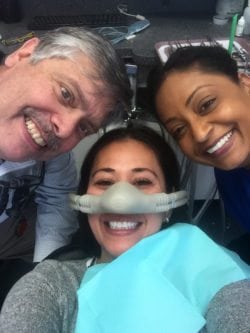Dental anxiety and fear are a leading cause of poor oral health, often the result of a previous bad experience in the dentist chair. Dr. Sousa and the team at East Hills Dental Associates work with anxious and fearful patients to put them at ease, make them feel comfortable, and build confidence through patient education and communication. Dental sedation can often enable an anxious or fearful patient to receive several treatments during one visit to restore or maintain a healthy, vibrant smile. We use dental sedation options for patients who utilize our cosmetic, restorative, and general dentistry treatments and services.

Enjoying optimal oral health not only gives you the confidence to smile more often but also supports your overall health and well-being in many ways. We welcome new patients, including those who have been avoiding the dentist chair out of fear. Dr. Sousa and our team work with you on an individual basis to find the solution that works best for relieving your stress and calming your fears. Sometimes, a thorough explanation of what your dental procedure will involve can instill confidence and help you to feel more relaxed in the dentist’s chair.
Dental Sedation in Roslyn Heights
Dr. Sousa will meet with you to discuss your concerns and medical history before recommending a sedation option most suitable for your needs. Our office offers conscious sedation in oral or gas form, depending on your overall health and preference. These types of sedation will help you feel completely relaxed, often with little memory, while remaining alert and responsive during treatment.
- Oral conscious sedation: Dr. Sousa can prescribe an oral sedative that may require an at-home dose. Patients will need an escort to and from their appointment.
- Nitrous oxide: known as “laughing gas”, nitrous oxide is administered via a small cannula placed beneath the nose for inhaling the odorless gas. One of the benefits of using nitrous oxide is that it takes effect and wears off almost immediately so patients can drive themselves to and from their appointment.
Sedation Dentistry FAQs
Will oral conscious sedation put me to sleep?
No, but it will make you extremely drowsy. So much so that you will not be able to operate a vehicle before or after your appointment. While this moderate sedation may cause you to fall asleep on your own, you will be able to wake easily and respond to the dental staff. Even though you remain awake, it is highly unlikely you will remember much of what happened during the appointment, especially any pain felt, once the medication has worn off.
Does dental insurance cover sedation dentistry?
In a majority of the cases, no. Most dental insurance plans only cover preventive dental care and a portion of restorative care. Since dental sedation isn’t necessary to have procedures completed, most will not cover the use of sedation during treatments. However, there may be circumstances that your insurance will cover/partially cover the use of sedation. We encourage you to contact your provider to learn about your particular plan’s coverage.
Will dental sedation help my gag reflex?
While under sedation, your mouth and throat muscles will be more relaxed. This will significantly lower your chances of gagging during any dental treatment. We understand that gagging is almost impossible to control and can keep patients from receiving the dental care they need. We highly recommend using dental sedation to control your gag reflex!
Is sedation safer than anesthesia?
Sedation and anesthesia are both tools for managing pain and discomfort during procedures. Their safety depends on the patient’s health and the procedure they will undergo. Sedation generally carries fewer risks than general anesthesia. Discuss your health history and dental concerns with your dentist or anesthesiologist to choose the best option. Safety is our dental office’s top priority.
What can I expect after sedation dentistry?
After sedation dentistry, you might feel dizzy or sleepy as the sedative wears off. Some patients also experience minor temporary side effects like dry mouth, headache, or nausea. It’s important to have a relative or close friend drive you home after the procedure. The sedative can take a few hours to leave your system completely. Rest and hydration are keys to recovery. Your dentist will provide specific aftercare instructions to ensure a smooth recovery.
Is sedation dentistry safe for senior citizens?
Yes, sedation dentistry is generally safe for senior citizens. However, it will ultimately depend on the patient’s overall health status. Older adults often have more medical conditions or take more medications, which could interact with sedatives. Therefore, the dentist or anesthesiologist must understand a senior patient’s medical history and current medications before sedation. With careful monitoring, sedation can help make dental procedures more comfortable and stress-free for seniors.
